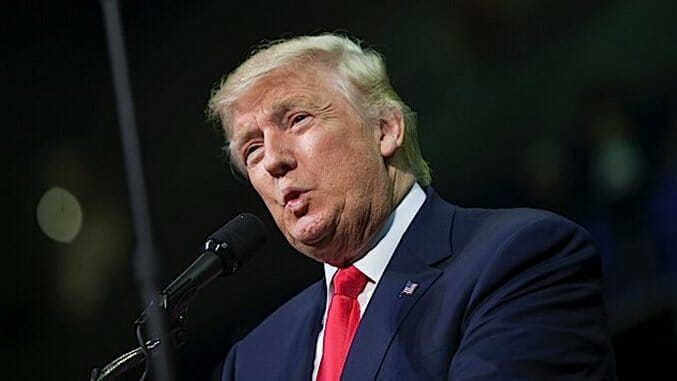Don’t Be Fooled: Trump’s Phone Call to Taiwan Was No Accident
Talking to Taiwan was a mistake. But it was intentional.
Photo courtesy of Getty
If we’ve learned anything over the last 18 months it’s that Donald Trump can prevail when no one believes he will. What we think are clearly dumb or thoughtless choices have been winners. So at what point do we get honest with ourselves and give the guy some credit?
I don’t want to. But even if we can’t give credit to the Donald — he seems determined to prove he doesn’t deserve it — at some point we need to stop deluding ourselves and at least take the experienced people around him seriously. They’re going to be running the country. Plus, they’ve proved critics wrong every time. They might be making yuge mistakes, but they’re intentional.
We don’t know much about how Trump’s mind works. It seems arbitrary and mostly driven by his pathological desire to be admired. But it’s time to take what we do know about Trump as a campaigner and apply that to policy. We know two things:
1. Trump doesn’t seem to believe in anything, or at least doesn’t care about his beliefs.
2. He’ll say anything he needs to at any time, just so it looks like he’s right.
This means we can probably assume Trump is what foreign policy experts call a “realist.” That is, he’s practical, not ideological. But where realists in the past — Obama, for instance — try to be agnostic of their ideals so they don’t get in the way of making the right strategic choice, Trump is completely devoid of ideology. Put this way, we can better understand what we have been calling the post-truth era: Damn not just truth, but the value of truth.
That is, it’s not “win at any cost” — to Trump, there’s no cost, period. Debt obviously doesn’t factor into anything. In fact, the opposite is true: He thinks debt is valuable. Trump’s not a realist: He’s a nihilist. We haven’t seen this before, at least not in a president, as far as I know.
The ill-advised call Trump took Friday with President Tsai Ing-wen of Taiwan is a great case study here.
The call was alarming, to put it lightly. And Trump, in an incoherent knee-jerk Twitter defense, made it quite clear he’s dangerously ignorant of major geopolitical flashpoints. Just about everyone with any foreign policy experience — even an international relations class in undergrad — immediately ripped him for it. Many people in the government were terrified, and rightly so. If nothing else, an American president needs to know two basic things about foreign policy: You don’t fuck with India and Pakistan, and you don’t fuck with China and Taiwan.
So the question now is: Did Trump really not know this, or did he just not care?
It’s tough to sum up the triangular relationship between the U.S., China, and Taiwan. It’s super complicated, but pretty fascinating. There are a lot of nuances, and if you want a good take, this is it. This quick metaphor pretty well gets the gist of the feelings:
-

-

-

-

-

-

-

-

-

-

-

-

-

-

-

-

-

-

-

-

-

-

-

-

-

-

-

-

-

-

-

-

-

-

-

-

-

-

-

-








































